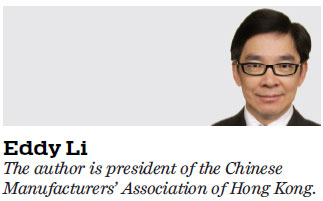HK should be proud for and grateful to our country
Updated: 2017-07-02 14:35
By Eddy Li(HK Edition)
|
|||||||||
This year marks the 20th anniversary of Hong Kong's return to China. Over the past two decades, Hong Kong has contributed enormously to the opening-up of the Chinese mainland; in return, Hong Kong has benefited from national development, enjoying numerous privileges granted by the central government.
As one who had longed for the return of Hong Kong before 1997, I glory in the progress of our country. We have witnessed the emergence of a vibrant economy; the mainland has become the second-largest economy in the world. The country is leading the world in many areas: It has the most expansive transport network in the world; it has also achieved great success in science and technology development, such as the manufacture of the world's fastest supercomputer and development of the first Chinese-built passenger jet C919.

I believe the business community, me included, is especially impressed by the great achievements of our country over past two decades. Hong Kong businessmen are always at the forefront of the mainland's economic reform process, sharing their experiences with and introducing international practices to their mainland peers. When the country entered the high-speed development era, Hong Kong companies worked hand-in-hand with their mainland allies, jointly establishing the world-renowned "made in China" signature. We are grateful to the nation for the preferential policies the central government offered Hong Kong over the course of national development, which have helped promote Hong Kong's own economic development. For example, the CEPA (Mainland and Hong Kong Closer Economic Partnership Arrangement) has helped Hong Kong companies tap into the huge mainland market; when the SARS epidemic erupted and brought devastating damage to the Hong Kong economy in 2003, the central authorities implemented the timely Individual Visit Scheme (IVS), helping to resuscitate the local tourism industry; over the years, numerous mainland companies, encouraged by the central authorities, have invested in Hong Kong and list their shares in the local stock market.
At a time when the world is gripped by so many problems, such as refugee crises, rising terrorism and rampant trade protectionism, most major economies teeter. China is charging full speed ahead, playing the role of a leading power. It came up with the Belt and Road Initiative, with the aim of creating a conducive environment for regional economic development and cooperation. I was fortunate enough to join the Hong Kong Special Administrative Region delegation to the Belt and Road Forum for International Cooperation held in Beijing in May; during the event I witnessed firsthand the worldwide recognition of China's international status. More than 130 nations participated in this event.
Aside from being grateful to our country, I feel strongly the need for Hong Kong to enhance its role in the country's future development. The city should not only serve as a window for foreign countries to know about China but also as a super-connector, who will proactively introduce our country to the outside world.
With most major advanced markets like Europe, the United States and Japan remaining in a slump, Hong Kong should set its sights on emerging markets. The Belt and Road Initiative and Guangdong-Hong Kong-Macao Greater Bay Area provide opportunities for Hong Kong to give full play to its competitive advantages. These state strategies require the existence of an international metropolis to be the center of finance, professional services, offshore yuan businesses, asset management, overseas headquarters, arbitration, logistics, shipping, aviation, etc. Hong Kong has the right conditions for the development of these centers. By acting as an active super-connector, we would not only help push forward these national strategies but also benefit from them.
When Hong Kong participates in those international economic cooperation projects, the policy of "one country, two systems" is especially helpful. The "one country" element provides a comfortable buffer for Hong Kong companies against external shocks while the "two systems" factor guarantees a high degree of openness and freedom for business. Hong Kong can take advantage of this unique feature: Most countries and regions along the Belt and Road practice capitalism, as Hong Kong does; the latter can help smooth any frictions between the mainland and other economies. A case in point: The Chinese Manufacturers' Association of Hong Kong visited three countries (Kazakhstan, Kyrgyzstan and Uzbekistan) in Central Asia last year. During the meetings with local officials, I could see their admiration for China's rapid economic growth. As a group of Hong Kong businessmen who have witnessed the whole course of China's reform and opening-up, we didn't hesitate to share our experiences of investing in the mainland with them; those officials were obviously more confident about the Belt and Road project after communicating with the visiting group.
Hong Kong is essentially an economy-oriented city; focusing on what economically benefits us the most is the best way to improve people's livelihood. I sincerely wish Hong Kong a brighter and brighter future under the leadership of our central government.
(HK Edition 07/02/2017 page7)